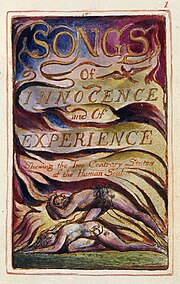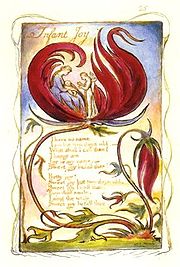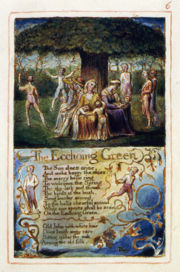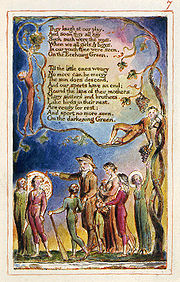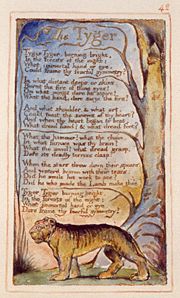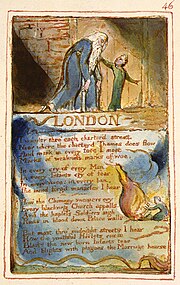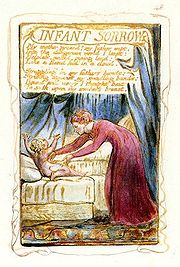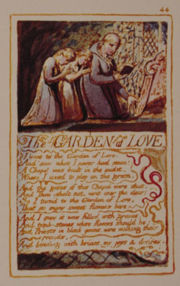William Blake Songs of Innocence and Experience
Contents
Innocence:
Infant Joy
I have no name:
I am but two days old.
What shall I call thee?
I happy am,
Joy is my name.
Sweet joy befall thee!
Pretty joy!
Sweet joy, but two days old.
Sweet joy I call thee:
Thou dost smile,
I sing the while,
Sweet joy befall thee!
Comment:
There is no clear metre in the poem; it's fluid and adaptable rather than rigid and predictable. The poem prioritises the child narrator’s voice: three of the first five lines are spoken by the new-born child. There is a sense of empowerment of the traditionally marginalised (newborn children). This was quite a revolutionary concept for Industrial-age Britain.
Stanza 1 alternates between mother and child creating a strong relationship between the two. Simple diction: light, clean, mostly mono-syllabic. There is almost no concrete imagery outside the mother and child. Very few nouns or adjectives of things peripheral to the relationship. This has a sense of focusing the poem in on what matters: the mother and child.
Chiasmus (blanketed rhyme scheme) ABCDDC emphasises security, protection
Assonance ‘I have, I am,’ ‘Sweet joy befall,’ Soft, soothing sounds. Lullaby quality. Soft consonant sounds: have no name.
The Ecchoing Green
The Sun does arise,
And make happy the skies;
The merry bells ring
To welcome the Spring;
The sky-lark and thrush,
The birds of the bush.
Sing louder around
To the bells' chearful sound,
While our sports shall be seen
On the Ecchoing Green.
Old John, with white hair.
Does laugh away care,
Sitting under the oak,
Among the old folk.
They laugh at our play,
And soon they all say:
"Such, such were the joys
When we all, girls & boys,
In our youth time were seen
On the Ecchoing Green."
Till the little ones, weary.
No more can be merry;
The sun does descend,
And our sports have an end.
Round the laps of their mothers
Many sisters and brothers.
Like birds in their nest.
Are ready for rest,
And sport no more seen
On the darkening Green.
Comment:
Imagery: Sun: image of morning, light and growth. Homophone of sun/son and the idea of rising suggests a possible Christian reading.
Tone: Immediate images of happiness, merriment.
Birds (natural elements) sing with joy. Nature is in harmony with the human elements of the poem. (imagery)
Metre primarily anapaests, light and skipping rhythm. Few metres adds to the simplistic feel.
Imagery Age contrasts with the narrator and his young friends. Old age is shown as static sitting beneath the tree. Youth typified by energy and creation. Youth can make age happy. Youth spreads joy.
Circular images: growth regeneration
Imagery: relationships: parents and children, sisters and brothers. Sense of community.
Symbolism: presence of parents: unified family units.
Simile: birds and nests/children and mothers’ laps
Variation on repetition: “darkening” instead of ecchoing. Implies something sinister.
Green: growth, renewal, but also village green, central part of a village.
Word choice/metaphor: bells treat Spring like a person, furthering the sense of the personality or nature.
Diction/Connotation: Spring brings warmth, light, growth, re-generation.
Personification: suggests growth and health of nature.
Diction: simple, often monosyllabic. Lots of positive connotations generated by words such as ‘merry’, ‘welcome’, chearful’, ‘laugh’ etc.
Rhyme (Couplets): AABB scheme has nursery rhyme predictability. Lends flow and song-like qualities to the poem.
Pronouns: First person narration (young narrator). Young people are empowered and listened to in this society.
Repetition of final line of stanza suggests predictability in the style of a children’s nursery rhyme.
Connotation: Ecchoing connotes conversation, response, enclosure, safety.
Old age’s reminiscences implies the impending loss of innocence.
First person plural pronouns imply unity and community.
Ebbing of energy.
Darkness begins to creep in. The beginning of the experienced world.
Holy Thursday (Innocence)
|
Listen to Librivox recordings of the poems: Experience: Other: |
Experience:
The Tyger
Tyger Tyger, burning bright,
In the forests of the night;
What immortal hand or eye,
Could frame thy fearful symmetry?
In what distant deeps or skies.
Burnt the fire of thine eyes?
On what wings dare he aspire?
What the hand, dare seize the fire?
And what shoulder, & what art,
Could twist the sinews of thy heart?
And when thy heart began to beat,
What dread hand? & what dread feet?
What the hammer? what the chain,
In what furnace was thy brain?
What the anvil? what dread grasp,
Dare its deadly terrors clasp!
When the stars threw down their spears
And water’d heaven with their tears:
Did he smile his work to see?
Did he who made the Lamb make thee?
Tyger Tyger burning bright,
In the forests of the night:
What immortal hand or eye,
Dare frame thy fearful symmetry?
London
I wander thro’ each charter’d street,
Near where the charter’d Thames does flow.
And mark in every face I meet
Marks of weakness, marks of woe.
In every cry of every Man,
In every Infants cry of fear,
In every voice: in every ban,
The mind-forg’d manacles I hear
How the Chimney-sweepers cry
Every black’ning Church appalls,
And the hapless Soldiers sigh
Runs in blood down Palace walls
But most thro’ midnight streets I hear
How the youthful Harlots curse
Blasts the new-born Infants tear
And blights with plagues the Marriage hearse
Comment:
The ‘wanderer’ is not controlled, therefore free to move and comment on the harshness of the physical and moral environment, almost like a floating angel or conscience. ‘Charter’d’: mapped, controlled,(even the Thames is physically constrained and harnessed for commerce and shipping. Charter is also a document setting out the rules one must obey when in a town.
The iambic metre establishes a plodding, monotonous tone, mimicking the act of walking through streets: I WANder THROUGH each CHART’d STREET
The faces that Blake’s narrator meets are depersonalised and disembodied. The word ‘every’ is repeated here and in the next stanza suggests universal suffering. The stress always falls on the word: ‘évery face’. It also generalises the population, grouping them all together. Mark means notice and comment on, mark on paper (in the poem), then the physical effects of living a life of weakness and woe.
The use of every again extends the effects of the weakness and woe to every citizen he sees. It’s effects spread like some kind of plague or disease (also an effect of industrialisation and overcrowding in cities like London). The metaphor of the child (symbol of the future) crying out in fear at a world that is not comfortable or enjoyable to them is present here (c.f. Infant Sorrow).
The mind forged manacles are probably the most important symbol in this poem. Blake imagines the mind as a blacksmith’s forge which make manacles (hand-cuffs, chains, restraints) which symbolise the constraints placed on individuals by society (religion, the law, the state, the monarchy). Jean-Jacques Rousseau who was a philosopher who influenced Blake said ‘Man is born free, but everywhere he is in chains.’ Blake suggests that rather than being put in (metaphorical) chains by society, mankind creates the manacles themselves by giving in to the pressure to conform to these moral, emotional and physical rules. Manacles(prisoners wore them) imply punishment for some crime. Bearing in mind Blake’s views on organised religion perhaps the unspoken crime is ‘the fall of man’: Adam and Eve’s ejection from the garden of Eden. The combination of abstract and concrete nouns (mind and manacles) links the intangible human mind and the industrial revolution. The alliterated ‘m’ sounds adds conformity and removes individuality while developing a sense of monotony. The fact that the mind forged manacles can be heard (clanking?) extends the physical effects of the imprisonment. The key thing to remember is that the manacles are self-imposed. Blake maintains that if you don’t want to give in to the pressure to conform, you don’t need to.
On the literal level, the churches are blackened by the smoke of the chimneys (cleaned by chimney sweeps) and the fires of industrial London. On a metaphorical level, the church is blackened/corrupted/condemned by their refusal to protest against the cruel use of children to sweep the chimneys. Black is the devils colour and represents the idea of being indifferent to human suffering. Man of religion should be appalled by this, but they are not. Also refers to a pall of smoke. Pall also has connotations of death: Pall-bearer, or to cast a pall (to darken). The metaphor is also developed by Blake to include the church’s failure to help the poor and the suffering in London.
This poem was written shortly after the beginning of the extremely bloody and brutal French Revolution, during which blood was said to be running down walls. This use of hyperbole suggests that the same thing could happen in London. It is the blood of a hapless (unfortunate) soldier that runs down the palace walls. The soldier is presumable fighting ‘for King and country’ trying to protect the monarchy from attack. The irony of the (protective) wall is that it keeps the soldier out just as much as it keeps the potential attackers out. This is a metaphor for the way that the monarchy protects its privilege and wealth from common people, often using the working classes to protect itself. The sibilant phrase ‘hapleSS SoldierS Sigh’ sounds like a sigh (last breath), reinforces the idea of resignation, giving up and it also has negative connotations as it sounds like the contempt that Blake has for this idea is being express as a hiss. The stress of the lines falls on blood and palace, linking the words together.
The sounds that Blake conjures up for us are cries in the dark, reminiscent of wailing in hell. The youthful harlots’ (prostitutes’) curses could be them swearing in the streets, but it could also be the sinful burden the city has to carry when young women have to make a living selling themselves. Even the most important of all relationships between men and women has become a matter of commerce. They sell the thing that was designed to be the act of creating new life, of defeating death. The wandering narrator also ‘hears’ the cry, punning on listening to, and being receptive to their cry.
Infant Sorrow
My mother groand! my father wept.
Into the dangerous world I leapt:
Helpless, naked, piping loud;
Like a fiend hid in a cloud.
Struggling in my fathers hands:
Striving against my swadling bands:
Bound and weary I thought best
To sulk upon my mothers breast
Comment:
Ambiguity of groand and wept. Uncertainty, doubt of the exp. world.
Helplessness- switch to trochee to increase sense of pace.
Striving is a trochee, the rest of the line is iambic. Emphasising collision, labouring
The Garden of Love
I went to the Garden of Love,
And saw what I never had seen:
A Chapel was built in the midst,
Where I used to play on the green.
And the gates of this Chapel were shut,
And Thou shalt not. writ over the door;
So I turn'd to the Garden of Love,
That so many sweet Bowers bore.
And I saw it was filled with graves,
And tomb-stones where flowers should be:
And Priests in black gowns, were walking their rounds,
And binding with briars, my joys & desires.
Comment
Imagery: Garden implies growth. Ambiguity between a garden that grows love and a garden that symbolises love. The green generates love through a sense of community.
Singular first person pronouns imply being alone, solitude. No sense of community.
Word choice: gates, shut, door.
Metre: Primarily anapaest, but use of spondees “thou shalt not” discordant, jarring sound, dropping out of established rhythm.
Word choice: ‘turn’d’ implies movement away from something. Youth?
Symbolism: ‘Tomb-stones’ replace the flowers. The classic image of growth and spring-like rejuvenation has been replaced by the classic image of death.
Black: implies evil, night, death, darkness, depression, loneliness.
Binding: constricting, constraining, preventing freedom.
“I never had seen” :the unknown. Ideas of discovery, knowledge experience.
Symbolism: building is not natural, man-made objects laid over the top of nature. Built in the midst. The church is usurping nature’s position in the centre of the world.
Past tense verbs, suggest time passing, ageing.
Word choice: ‘writ’, pun written, but also legal implications, not an emotional.
Word choice: bore, implies weight, load, but also childbirth. The safe, natural environment has been fertile in the past, but is no longer. It is the church that is expanding
‘Should be’ something is not right.
No rhyme scheme on in the final stanza. Shows that something is wrong, not right with the world.
Connotation: ‘briars’ thorns, imply suffering of Christ. Vine-like, growing, creeping.
